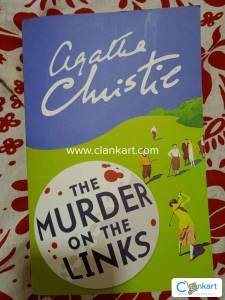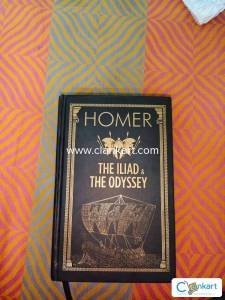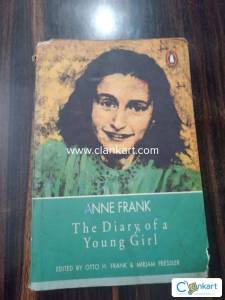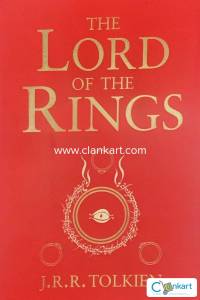Buy used Classics online in India
Buy Second Hand Books, Used Books Online In India
A Timeless Tale of Mischief, Friendship, and Adventure
"Tom Sawyer, a mischievous young boy, lives in the fictional town of St. Petersburg, Missouri with his Aunt Polly and half-brother Sid. Together with his friend Huckleberry Finn, the son of a drunk, ruthless father, he accidentally witnesses a murder. What unfolds in The Adventures of Tom Sawyer (1876) is a series of exhilarating events: both friends identify Injun Joe, the real murderer, in court; testify to the innocence of the person wrongly accused and find buried treasure in a haunted house. After autobiographical works like The Innocents Abroad (1869), and Roughing It (1872), this book was Mark Twain's debut novel that reflected the author's own experiences of youth and adulthood. He even chose to name his protagonist after a fireman whom he had met in San Francisco in 1863. Twain presents a sharp social commentary on 19th-century American life through Tom's tale of childhood resentment against societal hypocrisies."
THE PICTURE OF DORIAN GRAY By oscar wilde
'The horror, whatever it was, had not yet entirely spoiled that marvellous beauty' Enthralled by his own exquisite portrait, Dorian Gray exchanges his soul for eternal youth and beauty. Influenced by his friend Lord Henry Wotton, he is drawn into a corrupt double life, indulging his desires in secret while remaining a gentleman in the eyes of polite society. Only his portrait bears the traces of his decadence. The Picture of Dorian Gray was a succès de scandale. Early readers were shocked by its hints at unspeakable sins, and the book was later used as evidence against Wilde at the Old Bailey in 1895.This definitive edition includes a selection of contemporary reviews condemning the novel's immorality, and the introduction to the first Penguin Classics edition by Peter Ackroyd.
CHARLOTTE BRONTE By Jane eyre
Librarian note: An alternative cover for this ISBN can be found here.A gothic masterpiece of tempestuous passions and dark secrets, Charlotte Brontë's Jane Eyre is edited with an introduction and notes by Stevie Davis in Penguin Classics.Charlotte Brontë tells the story of orphaned Jane Eyre, who grows up in the home of her heartless aunt, enduring loneliness and cruelty. This troubled childhood strengthens Jane's natural independence and spirit - which prove necessary when she finds employment as a governess to the young ward of Byronic, brooding Mr Rochester. As her feelings for Rochester develop, Jane gradually uncovers Thornfield Hall's terrible secret, forcing her to make a choice. Should she stay with Rochester and live with the consequences, or follow her convictions - even if it means leaving the man she loves? A novel of intense power and intrigue, Jane Eyre dazzled readers with its passionate depiction of a woman's search for equality and freedom.
Tales of Japan by kotaro chiba
A deluxe volume of 15 Japanese folk tales that is sure to impress any fan of cultural and mythological literature with impactful and stunning illustrations by contemporary Japanese artist Kotaro Chiba. A goblin with no body and a monster with no face. A resourceful samurai and a faithful daughter. A spirit of the moon and a dragon king. This collection of 15 traditional Japanese folk tales transports readers to a time of adventure and enchantment. Drawn from the works of folklorists Lafcadio Hearn and Yei Theodora Ozaki, these tales are by turns terrifying, exhilarating, and poetic. POPULAR SERIES: Designed for diehard fairy tale and folklore lovers, the Tales series gives new life to traditional stories. In addition to Tales of Japan, discover Ghostly Tales, Nordic Tales, Celtic Tales, Tales of India, Tales of East Africa, and more. BEAUTIFUL GIFT: With its bold hardcover design, a satin ribbon page marker, and a striking full-page illustration for each story, Tales of Japan makes an impressive gift. Perfect for fans of fairy tales, ghost stories, Greek mythology, Roman mythology, Chinese mythology, Celtic mythology, and folklore and cultural studies from around the globe. READERS LOVE IT: With hundreds of 5-star ratings, reviewers rave that this "absolutely delightful collection of traditional Japanese folktales" is "a must-have for folklore fans." Perfect for:Anyone interested in Japan's history and culture studiesCollectors of illustrated classics or artfully designed booksReaders who enjoy timeless stories, from the fairy tales of the Brothers Grimm to Egyptian mythology to Greek classicsAdding to the shelf alongside Stephen Fry’s Greek Mythology trilogy (Mythos, Heroes, Troy), Neil Gaiman's Norse Mythology, or Madeline Miller's Circe and Song of Achilles
1984 & Animal Farm by george orwell
Newspeak, Doublethink, Big Brother, the Thought Police - the language of 1984 has passed into the English language as a symbol of the horrors of totalitarianism. George Orwell's story of Winston Smith's fight against the all-pervading Party has become a classic, not the least because of its intellectual coherence. First published in 1949, it retains as much relevance today as it had then.
Shakespeare books
About Author: William Shakespeare (baptised 26 April 1564 ? 23 April 1616) was an English poet and playwright, widely regarded as the greatest writer in the English language and the world's pre-eminent dramatist. He is often called England's national poet and the "Bard of Avon" (or simply "The Bard"). His surviving works consist of 38 plays, 154 sonnets, two long narrative poems, and several other poems. His plays have been translated into every major living language, and are performed more often than those of any other playwright. Shakespeare produced most of his known work between 1590 and 1613. His early plays were mainly comedies and histories, genres he raised to the peak of sophistication and artistry by the end of the sixteenth century. Next he wrote mainly tragedies until about 1608, including Hamlet, King Lear, and Macbeth, considered some of the finest examples in the English language. In his last phase, he wrote tragicomedies, also known as romances, and collaborated with other playwrights. Many of his plays were published in editions of varying quality and accuracy during his lifetime, and in 1623 two of his former theatrical colleagues published the First Folio, a collected edition of his dramatic works that included all but two of the plays now recognised as Shakespeare's.
Old books new knowledge
The Tragical History of the Life and Death of Doctor Faustus, commonly referred to simply as Doctor Faustus, is an Elizabethan tragedy by Christopher Marlowe, based on German stories about the title character Faust, that was first performed sometime between 1588 and Marlowe's death in 1593. Two different versions of the play were published in the Jacobean era, several years later. The powerful effect of early productions of the play is indicated by the legends that quickly accrued around them—that actual devils once appeared on the stage during a performance, "to the great amazement of both the actors and spectators", a sight that was said to have driven some spectators mad.
Arms and The Man
This witty masterpiece combines high comedy with social commentary as it deflates romantic misconceptions of love and warfare. First produced on the London stage in 1894, Arms and the Man is one of the most frequently acted and studied of Shaw's plays.When Arms and The Man premiered, Shaw was already a celebrity art critic and socialist lecturer. It was so successful that it immediately established him as one of the greatest wits of London's theatre scene. Shaw subtitled the play "An Anti-Romantic Comedy".Each title in the Bernard Shaw/AC Ward series has a general critical introduction to the works of Shaw, a specific introduction to the play itself, the author’s own preface, and also notes and glossaries. The series has now been enhanced and enriched with additional student-friendly features such as analyses of themes and characterisation, act-wise summaries and questions, and a select reading list. We hope that these value additions will help maintain the popularity that the series has long enjoyed with teachers and students alike.
Pride and Prejudice
Alternative (2006?) cover editon for ISBN: 9781853260001.Pride and Prejudice, which opens with one of the most famous sentences in English Literature, is an ironic novel of manners. In it the garrulous and empty-headed Mrs Bennet has only one aim - that of finding a good mavch for each of her five daughters. In this she is mocked by her cynical and indolent husband.With its wit, its social precision and, above all, its irresistible heroine, Pride and Prejudice has proved one of the most enduringly popular novels in the English language.
Murder on the Orient Express (Hercule Poirot, #10)
Just after midnight, a snowdrift stops the famous Orient Express in its tracks as it travels through the mountainous Balkans. The luxurious train is surprisingly full for the time of the year but, by the morning, it is one passenger fewer. An American tycoon lies dead in his compartment, stabbed a dozen times, his door locked from the inside.One of the passengers is none other than detective Hercule Poirot. On vacation. Isolated and with a killer on board, Poirot must identify the murderer—in case he or she decides to strike again.
Sherlock Holmes: The Complete Novels and Stories, Volume II
Since his first appearance in Beeton’s Christmas Annual in 1887, Sir Arthur Conan Doyle’s Sherlock Holmes has been one of the most beloved fictional characters ever created.Now, in two paperback volumes, Bantam presents all fifty-six short stories and four novels featuring Conan Doyle’s classic hero—a truly complete collection of Sherlock Holmes’s adventures in crime!Volume II begins with The Hound of the Baskervilles, a haunting novel of murder on eerie Grimpen Moor, which has rightly earned its reputation as the finest murder mystery ever written.The Valley of Fear matches Holmes against his archenemy, the master of imaginative crime, Professor Moriarty.In addition, the loyal Dr. Watson has faithfully recorded Holmes’s feats of extraordinary detection in such famous cases as the thrilling The Adventure of the Red Circle and the twelve baffling adventures from The Case Book of Sherlock Holmes.Conan Doyle’s incomparable tales bring to life a Victorian England of horse-drawn cabs, fogs, and the famous lodgings at 221B Baker Street, where for more than forty years Sherlock Holmes earned his undisputed reputation as the greatest fictional detective of all time.
Dan Brown Inferno
'Seek and ye shall find.'With these words echoing in his head, eminent Harvard symbologist Robert Langdon awakes in a hospital bed with no recollection of where he is or how he got there. Nor can he explain the origin of the macabre object that is found hidden in his belongings.A threat to his life will propel him and a young doctor, Sienna Brooks, into a breakneck chase across the city of Florence. Only Langdon's knowledge of hidden passageways and ancient secrets that lie behind its historic facade can save them from the clutches of their unknown pursuers.With only a few lines from Dante's dark and epic masterpiece, The Inferno, to guide them, they must decipher a sequence of codes buried deep within some of the most celebrated artefacts of the Renaissance - sculptures, paintings, buildings - to find the answers to a puzzle which may, or may not, help them save the world from a terrifying threat.Set against an extraordinary landscape inspired by one of history's most ominous literary classics, Inferno is Dan Brown's most compelling and thought-provoking novel yet, a breathless race-against-time thriller that will grab you from page one and not let you go until you close the book.
The Elements of Coordinate Geometry - SL Loney
ABOUT THE BOOK The "Classic Text Series" is a collection of books written by the most famous mathematicians of their time and has been proven over the years as the most preferred concept-building tool to learn mathematics. Arihant's imprints of these books are a way of presenting these timeless classics. Known as the early influencer on Ramanujan, SL LONELY was a great mathematician from 1800. The book "Coordinate Geometry" has been updated and deals with the modern treatment of complex concepts of Coordinate Geometry. Formulated as per the latest syllabus, this complete preparatory guide is compiled with detailed theories, and a good collection of examples for an in-depth understanding of the concepts. The unique features accumulated in this book 1. Complete coverage of syllabus in 17 Chapters 2. Covers all the aspects of Cartesian and Polar Coordinates 3. Enormous Examples for an in-depth understanding of topics 4. Works as an elementary textbook to build concepts 5. Chapterwise study notes, Answers TABLE OF Chapter 1- Introduction, Chapter 2- Coordinates, Chapter 3- Locus, Chapter 4- The Straight Line Rectangular Coordinates, Chapter 5- The Straight Line Polar Equations & Oblique Coordinates, Chapter 6- Equations Representing Two Or More Straight Lines, Chapter 7- Transformation Of Coordinates, Chapter 8- The Circle, Chapter 9- Systems of Circles, Chapter 10- Conic Sections. The Parabola, Chapter 11- The Parabola (Continued), Chapter 12- The Ellipse, Chapter 13- The Hyperbola, Chapter 14- Polar Equation To A Conic, Chapter 15- General Equation. Tracing Of Curves, Chapter 16- General Equation, Chapter 17- Miscellaneous Propositions, Answers
'Tender is the Night' - A Modernist Fitzgerald Plot
'I don't ask you to love me always like this, but I ask you to remember. Somewhere inside me there'll always be the person I am to-night.'Between the First World War and the Wall Street Crash the French Riviera was the stylish place for wealthy Americans to visit. Among the most fashionable are psychoanalyst Dick Diver and his wife Nicole, who hold court at their villa. Into their circle comes Rosemary Hoyt, a film star, who is instantly attracted to them, but understands little of the dark secrets and hidden corruption that hold them together. As Dick draws closer to Rosemary, he fractures the delicate structure of his marriage and sets both Nicole and himself on to a dangerous path where only the strongest can survive. In this exquisite, lyrical novel, Fitzgerald has poured much of the essence of his own life; he has also depicted the age of materialism, shattered idealism and broken dreams.The Penguin English Library - collectable general readers' editions of the best fiction in English, from the eighteenth century to the end of the Second World War.
Sherlock Holmes
The complete collection of Sir Arthur Conan Doyle's Sherlock Holmes tales, both long and short, compiled together for the first time by Simon & Schuster. This fantastic collection is accompanied by an exciting new introduction from Robert Ryan, a writer whose own book, Dead Man's Land, has been fully endorsed by the Conan Doyle Estate. A big Holmes fan himself, he will undoubtedly provide a fascinating new look at the detective and his bizarre ability to read both people and objects, in order to discover who dunnit.
Agatha Christie Book (Poirot)
Belgian detective Hercule Poirot is summoned to France after receiving a distressing letter with a urgent cry for help. Upon his arrival in Merlinville-sur-Mer, the investigator finds the man who penned the letter, the South American millionaire Monsieur Renauld, stabbed to death and his body flung into a freshly dug open grave on the golf course adjoining the property. Meanwhile the millionaire's wife is found bound and gagged in her room. Apparently, it seems that Renauld and his wife were victims of a failed break-in, resulting in Renauld's kidnapping and death. There's no lack of suspects: his wife, whose dagger served as the weapon; his embittered son, who would have killed for independence; and his mistress, who refused to be ignored - and each felt deserving of the dead man's fortune. The police think they've found the cumprit. But Poirot has his doubts. Why is the dead man wearing an overcoat that is too big for him? And who was the impassioned love-letter in the pocket for? Before Poirot can answer these questions, the case is turned upside down by the discovery of a second, identically murdered corpse...
THE ILIAD & THE ODYSSEY
Embark on a literary odyssey through ancient Greece with Homer's timeless epics, The Iliad and The Odyssey. In The Iliad, witness the ravages of the Trojan War as gods and mortals clash in a tale of honor, heroism, and the consequences of unchecked pride. Then, journey alongside Odysseus in The Odyssey as he battles mythical creatures, evades vengeful gods, ad strives to return home, navigating treacherous seas and testing the limits of human resilience. These masterpieces of ancient literature capture the essence of the human experience, exploring themes of love, loss, destiny, and the indomitable spirit of adventure.Epic tales of ancient heroes and legendary battles.Unforgettable characters shaped by gods and destiny.Timeless exploration of human emotions and triumphs.Gripping narratives of honor, courage, and sacrifice.Immersive journey through ancient Greece's mythical landscapes.Homer is known to have authored the first known literature of Europe. He is revered as one of the greatest of the ancient Greek epic poets in the Western classical tradition, and is credited with the enduring epic tales of The Illiad and The Odyssey. Though when he lived is not known, it is estimated by Herodotus, a Greek historian, that Homer lived around 400 years before his own time. Through vividly portrayed characters and memorable descriptions of battles, Homer has glorified war in The Iliad. He also seems to hold up with the notion that the victory of military values overrides family life. Amidst everything else, Homer reminds the readers of the impermanence of mortals and their creations. The Iliad, written in dactylic or heroic hexameter, is among the oldest extant works of Western literature. Nearly all editions—ancient, modern, and translations—are divided into twenty-four books. It continues to remain a rare classic with an extremely captivating lyrical beauty.
Murder on the orient express
Agatha Christie’s most famous murder mystery, reissued with a new cover to tie in with the hugely anticipated 2017 film adaptation.Just after midnight, a snowdrift stops the Orient Express in its tracks. The luxurious train is surprisingly full for the time of the year, but by the morning it is one passenger fewer. An American tycoon lies dead in his compartment, stabbed a dozen times, his door locked from the inside.Isolated and with a killer in their midst, detective Hercule Poirot must identify the murderer – in case he or she decides to strike again.
Romance novel
She's his opposite in every way...and the greatest temptation he's ever known. Reserved, controlled, and proper to a fault, Kai Young has neither the time nor inclination for chaos—and Isabella, with her purple hair and inappropriate jokes, is chaos personified. With a crucial CEO vote looming and a media empire at stake, the billionaire heir can’t afford the distraction she brings. Isabella is everything he shouldn’t want, but with every look and every touch, he’s tempted to break all his rules…and claim her as his own. *** Bold, impulsive, and full of life, Isabella Valencia has never met a party she doesn’t like or a man she couldn’t charm...except for Kai Young. It shouldn’t matter. He’s not her type—the man translates classics into Latin for fun, and his membership at the exclusive club where she bartends means he’s strictly off limits. But she can’t deny that, beneath his cool exterior, is a man who could make her melt with just a touch. No matter how hard they try, they can’t resist giving into their forbidden desires. Even if it costs them everything.King of Pride is a steamy opposites attract, forbidden billionaire romance. It's book two in the Kings of Sin series but can be read as a standalone.Contains explicit content and profanity. Recommended for mature readers only.
Children novel
Anne Frank's extraordinary diary, written in the Amsterdam attic where she and her family hid from the Nazis for two years, has become a world classic and a timeless testament to the human spirit. Now, in a new edition enriched by many passages originally withheld by her father, we meet an Anne more real, more human, and more vital than ever. Here she is first and foremost a teenage girl—stubbornly honest, touchingly vulnerable, in love with life. She imparts her deeply secret world of soul-searching and hungering for affection, rebellious clashes with her mother, romance and newly discovered sexuality, and wry, candid observations of her companions. Facing hunger, fear of discovery and death, and the petty frustrations of such confined quarters, Anne writes with adult wisdom and views beyond her years. Her story is that of every teenager, lived out in conditions few teenagers have ever known.
The Lord Of The Rings (All 3 Parts in 1 with 2 maps on the flaps)
One Ring to rule them all, One Ring to find them, One Ring to bring them all and in the darkness bind themIn ancient times the Rings of Power were crafted by the Elven-smiths, and Sauron, the Dark Lord, forged the One Ring, filling it with his own power so that he could rule all others. But the One Ring was taken from him, and though he sought it throughout Middle-earth, it remained lost to him. After many ages it fell by chance into the hands of the hobbit Bilbo Baggins.From Sauron's fastness in the Dark Tower of Mordor, his power spread far and wide. Sauron gathered all the Great Rings to him, but always he searched for the One Ring that would complete his dominion.When Bilbo reached his eleventy-first birthday he disappeared, bequeathing to his young cousin Frodo the Ruling Ring and a perilous quest: to journey across Middle-earth, deep into the shadow of the Dark Lord, and destroy the Ring by casting it into the Cracks of Doom.The Lord of the Rings tells of the great quest undertaken by Frodo and the Fellowship of the Ring: Gandalf the Wizard; the hobbits Merry, Pippin, and Sam; Gimli the Dwarf; Legolas the Elf; Boromir of Gondor; and a tall, mysterious stranger called Strider.
























